Phân tích độ tin cậy của thông tin doanh thu được ghi nhận theo chuẩn mực kế toán dựa trên quy định và chuẩn mực kế toán dựa trên nguyên tắc
Tóm tắt: Trong khi Hội đồng Chuẩn mực Kế toán quốc tế (IASB) và Hội đồng
Tiêu chuẩn Kế toán Tài chính (FASB) vẫn luôn nỗ lực để thống nhất một hệ
thống chuẩn mực kế toán chung trên toàn thế giới, những tranh cãi xung quanh
ưu và nhược điểm của chuẩn mực kế toán dựa trên nguyên tắc (principle-based
accounting standard) và chuẩn mực kế toán dựa trên quy định (rules-based
accounting standard) vẫn chưa đến hồi kết. Nhóm tác giả thực hiện bài nghiên
cứu này nhằm mục đích khẳng định những ưu điểm vượt trội của chuẩn mực kế
toán dựa trên nguyên tắc thông qua việc so sánh chất lượng thông tin doanh thu
được ghi nhận theo hướng dẫn của hai bộ chuẩn mực VAS 14 (đại diện cho
chuẩn mực kế toán dựa trên quy định) và IFRS 15 (đại diện cho chuẩn mực kế
toán dựa trên nguyên tắc) trong hoàn cảnh có động cơ và không có động cơ chi
phối. Kết luận của nhóm tác giả ủng hộ hệ thống chuẩn mực kế toán Việt Nam
nên đi theo hướng tuân theo nguyên tắc và các nhà hoạch định chính sách cần đề
ra một lộ trình hội nhập chuẩn mực kế toán phù hợp để các doanh nghiệp kịp thời
chuẩn bị cho việc chuyển đổi hệ thống kế toán nhưng vẫn đảm bảo được yêu cầu
nâng cao chất lượng của báo cáo tài chính. Đề tài được thực hiện thông qua một
cuộc khảo sát với 104 đối tượng đang công tác trong ngành kế toán – tài chính.
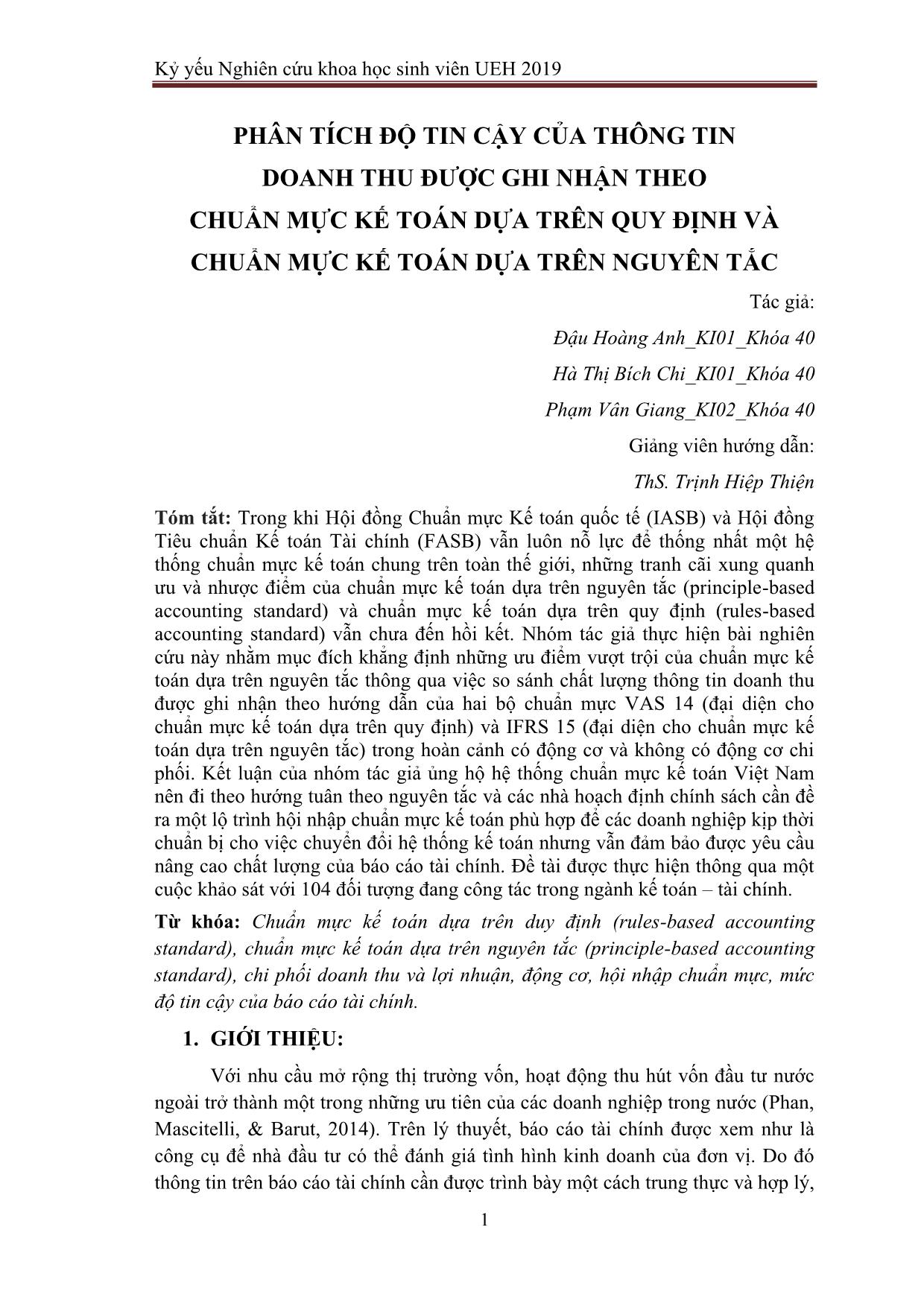
Trang 1
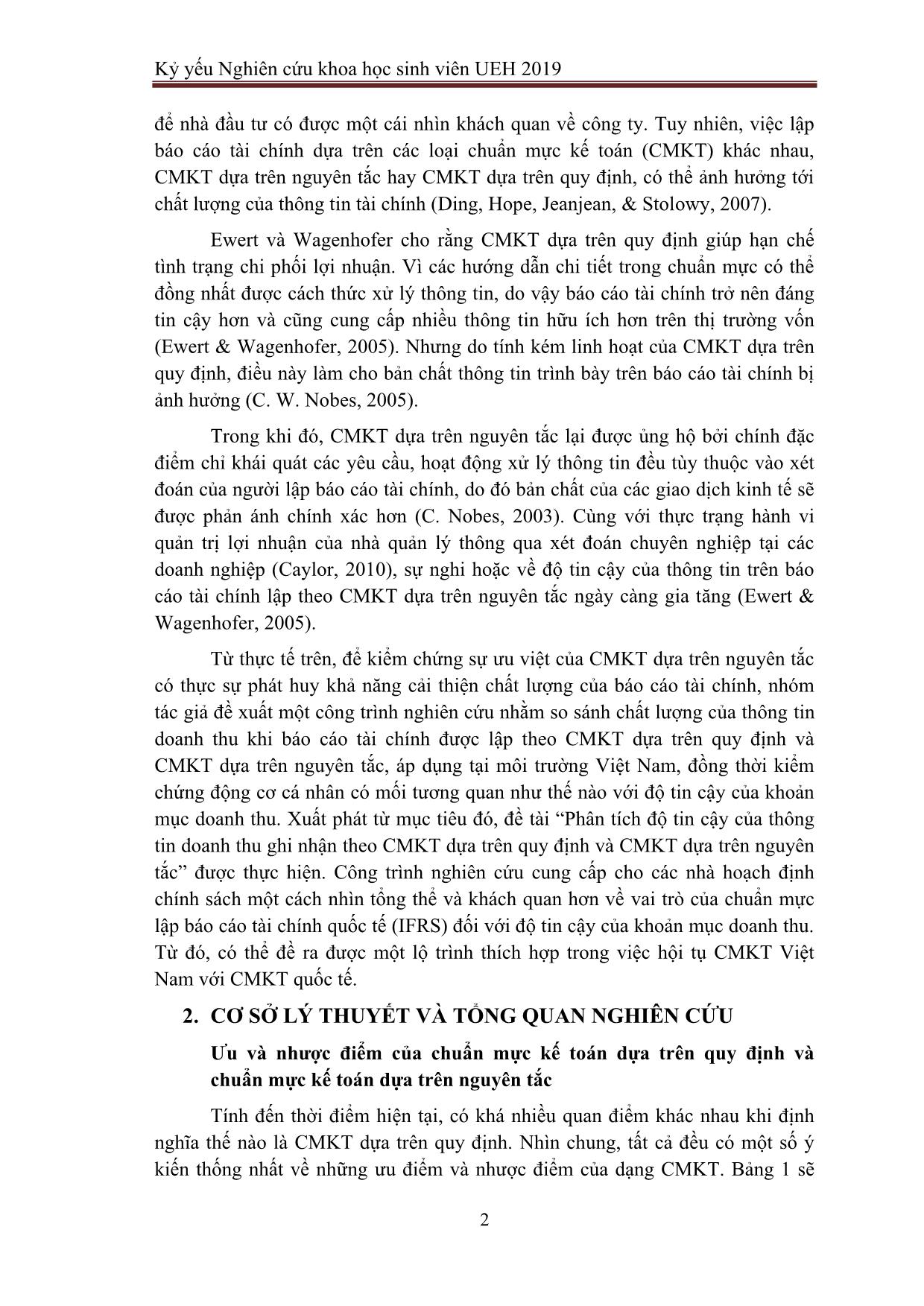
Trang 2
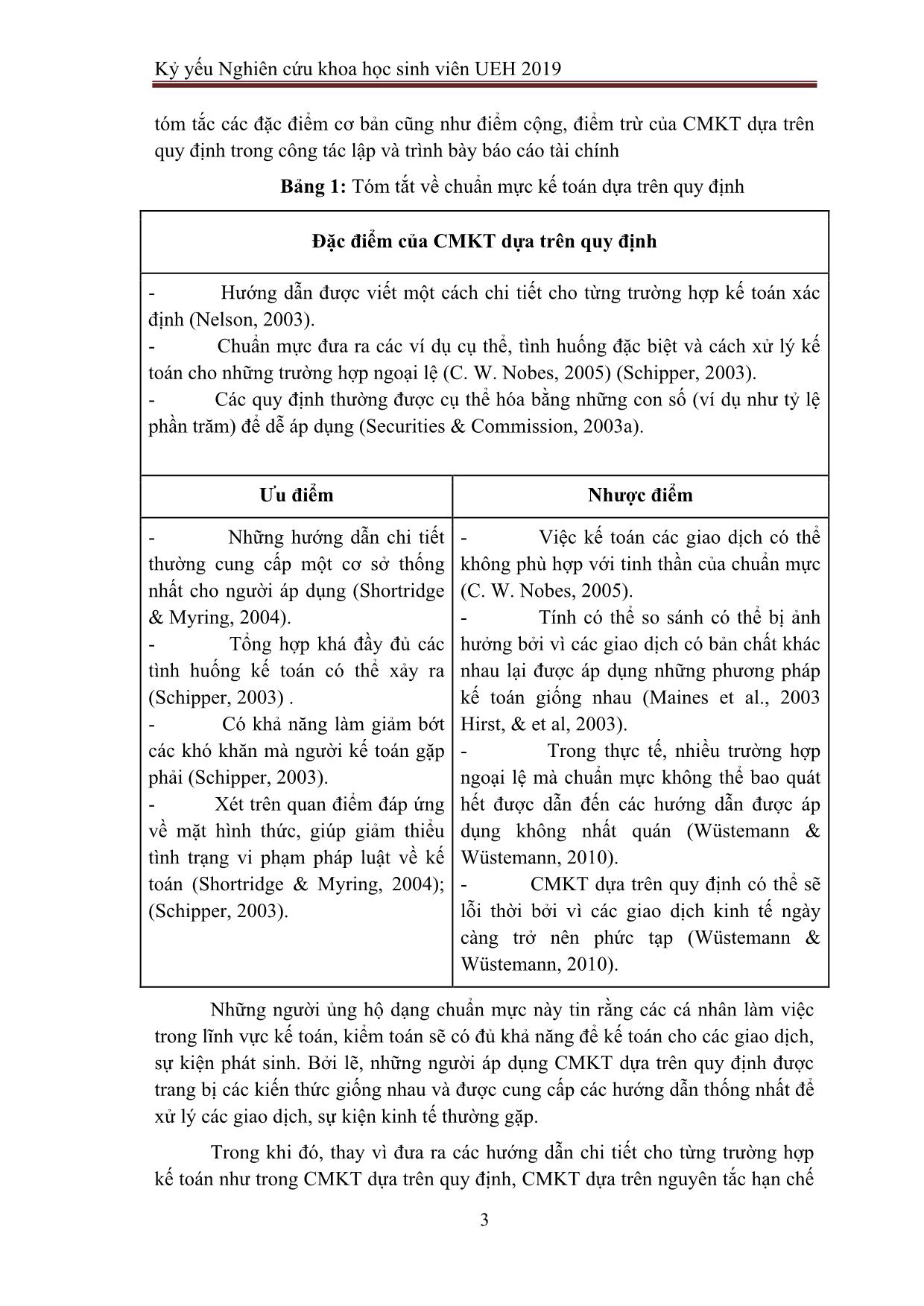
Trang 3
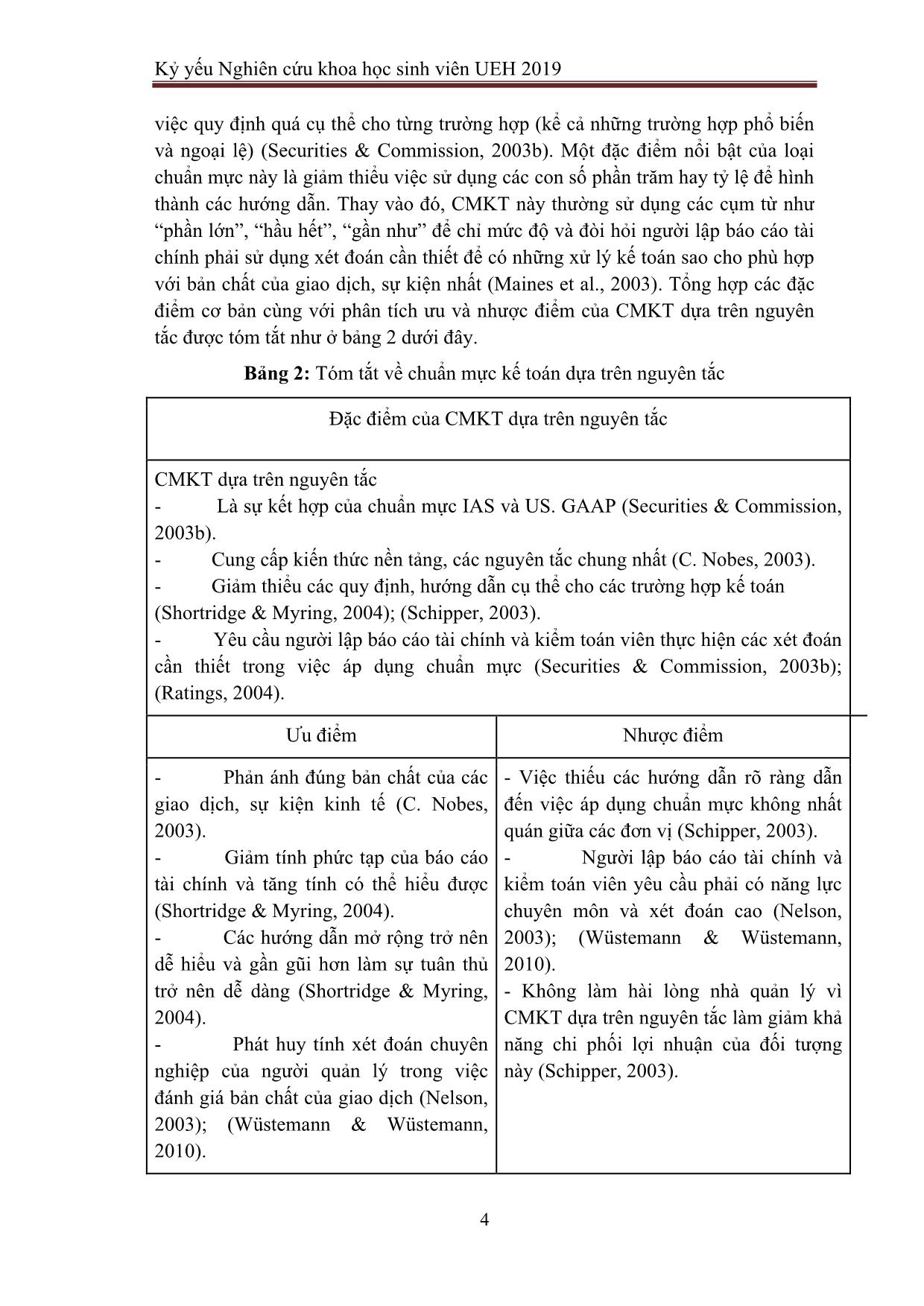
Trang 4
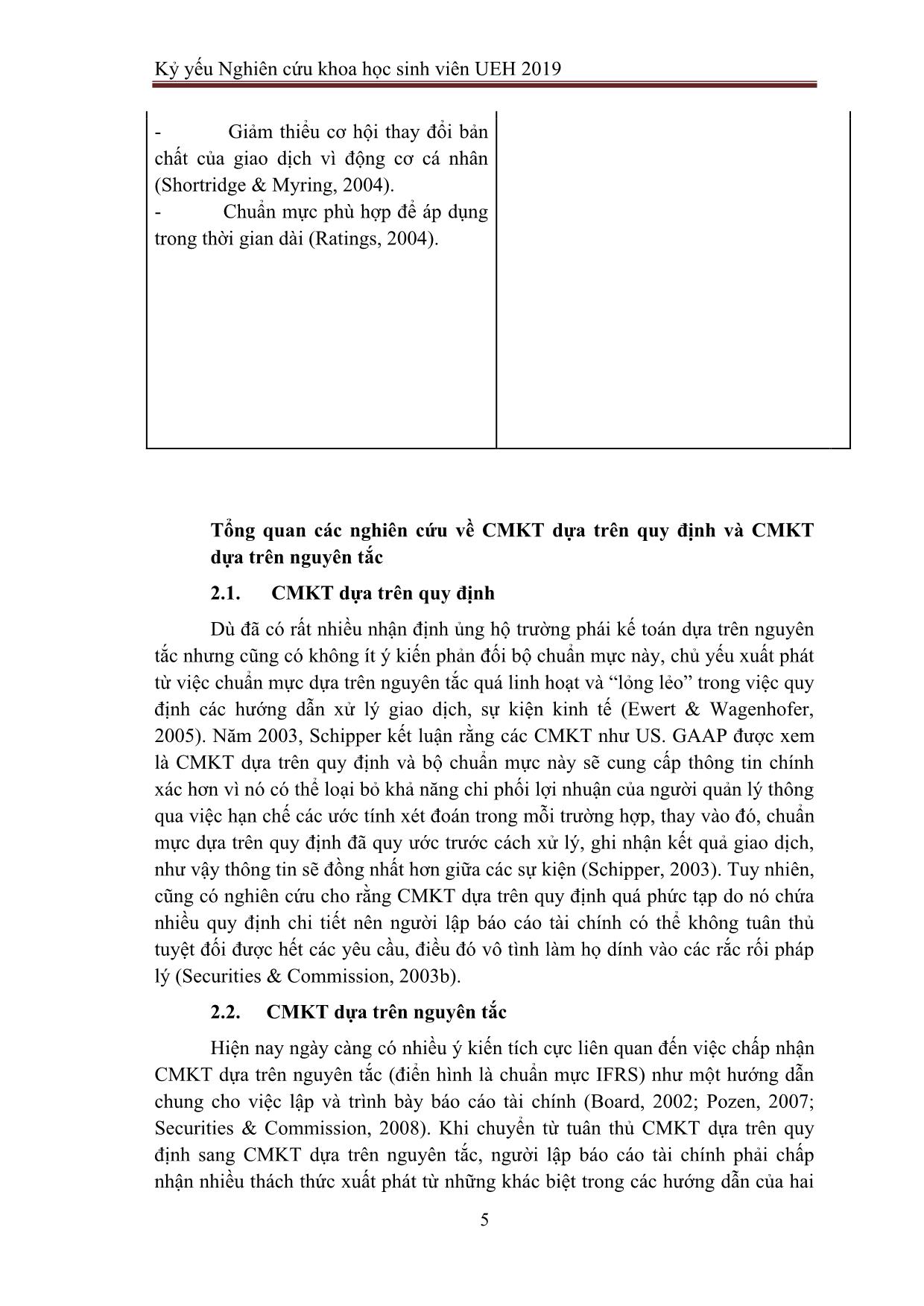
Trang 5
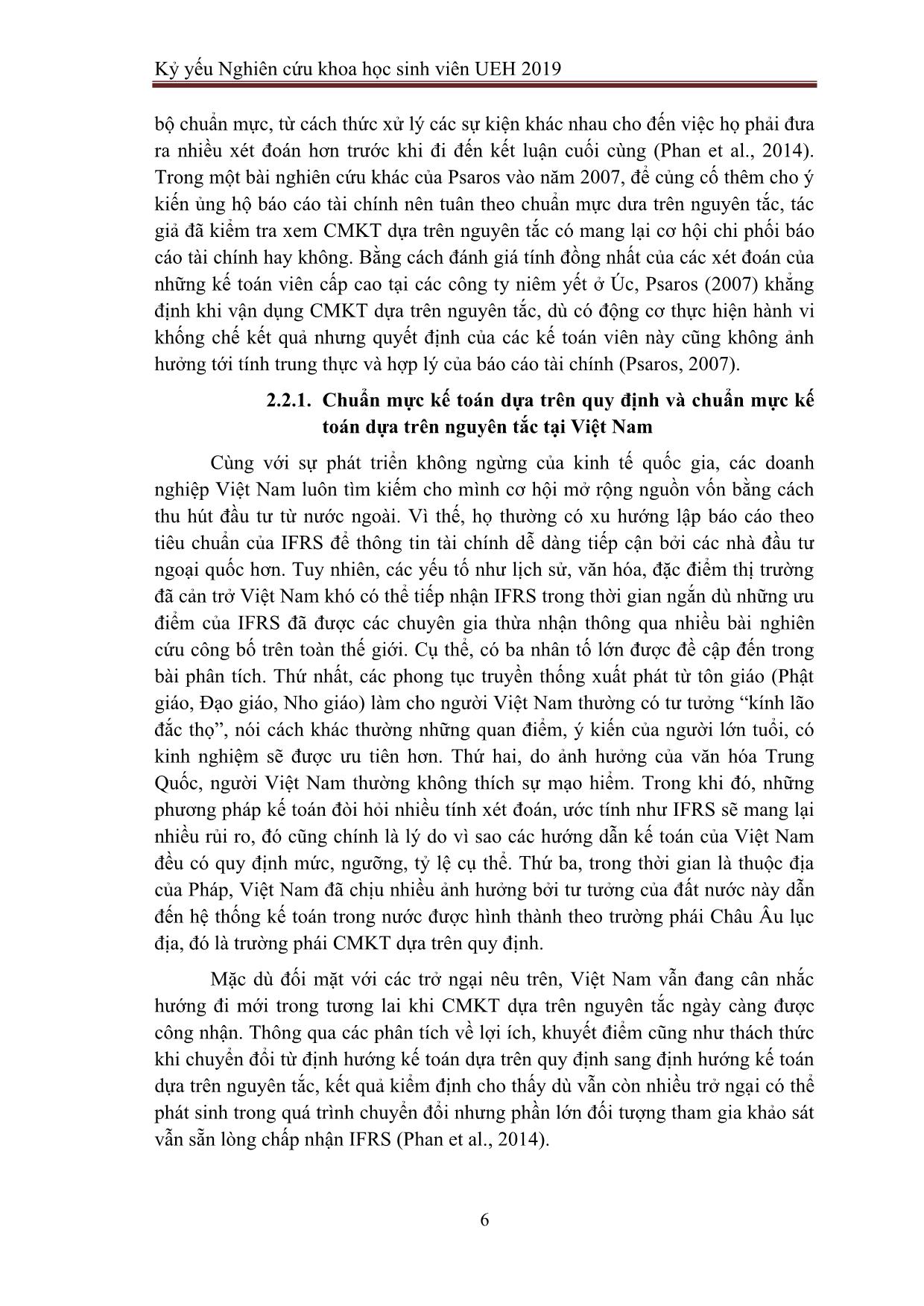
Trang 6
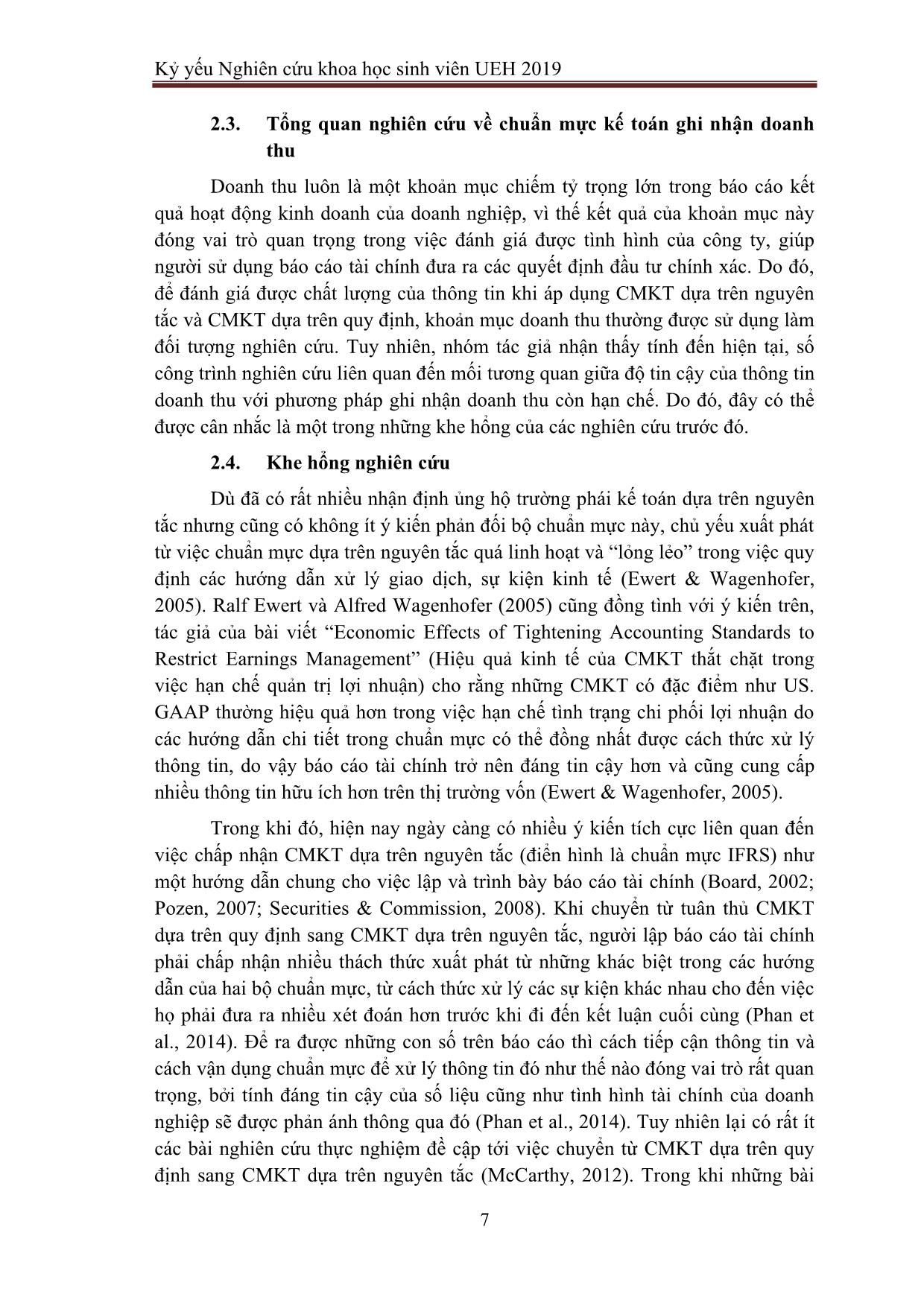
Trang 7
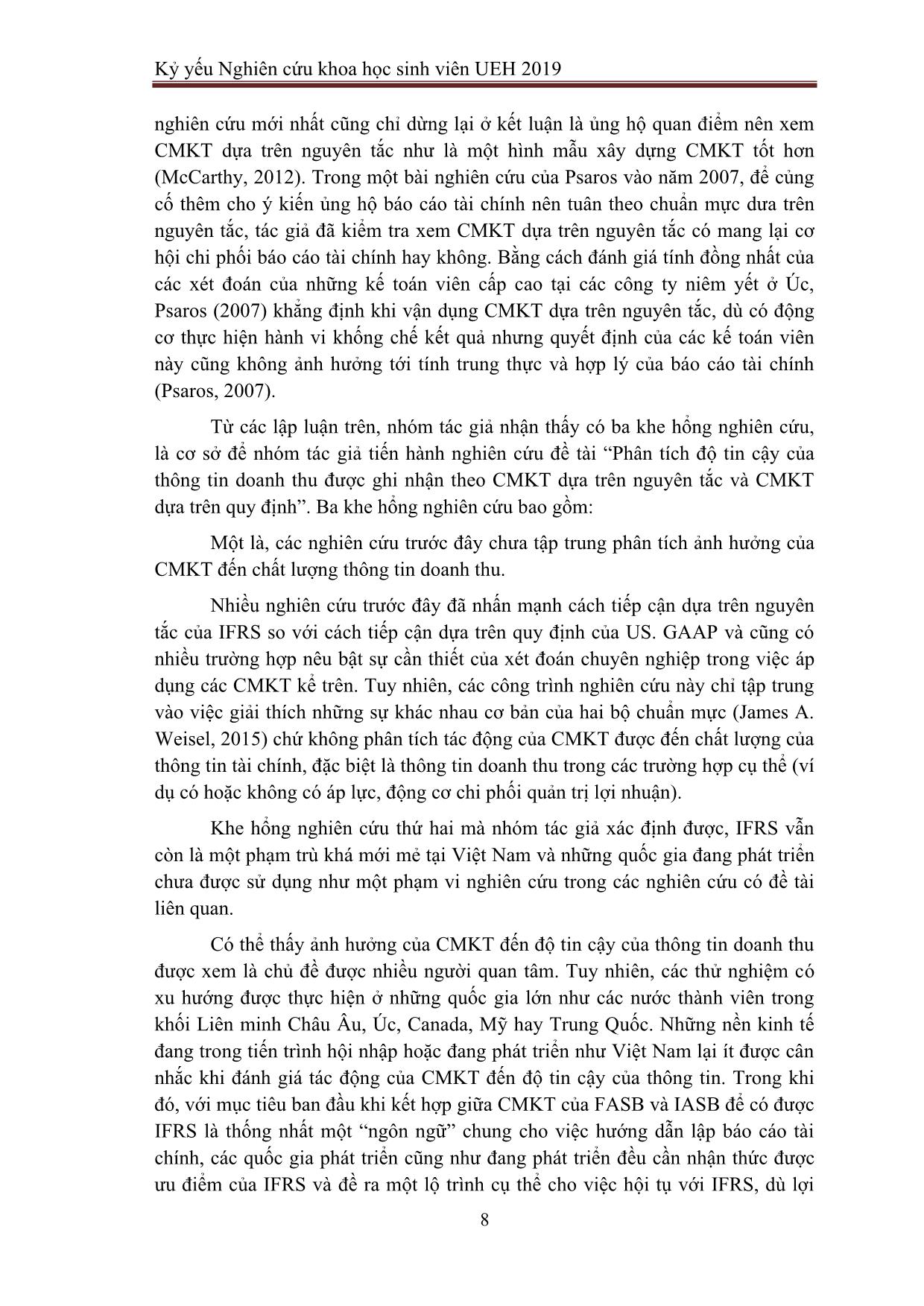
Trang 8
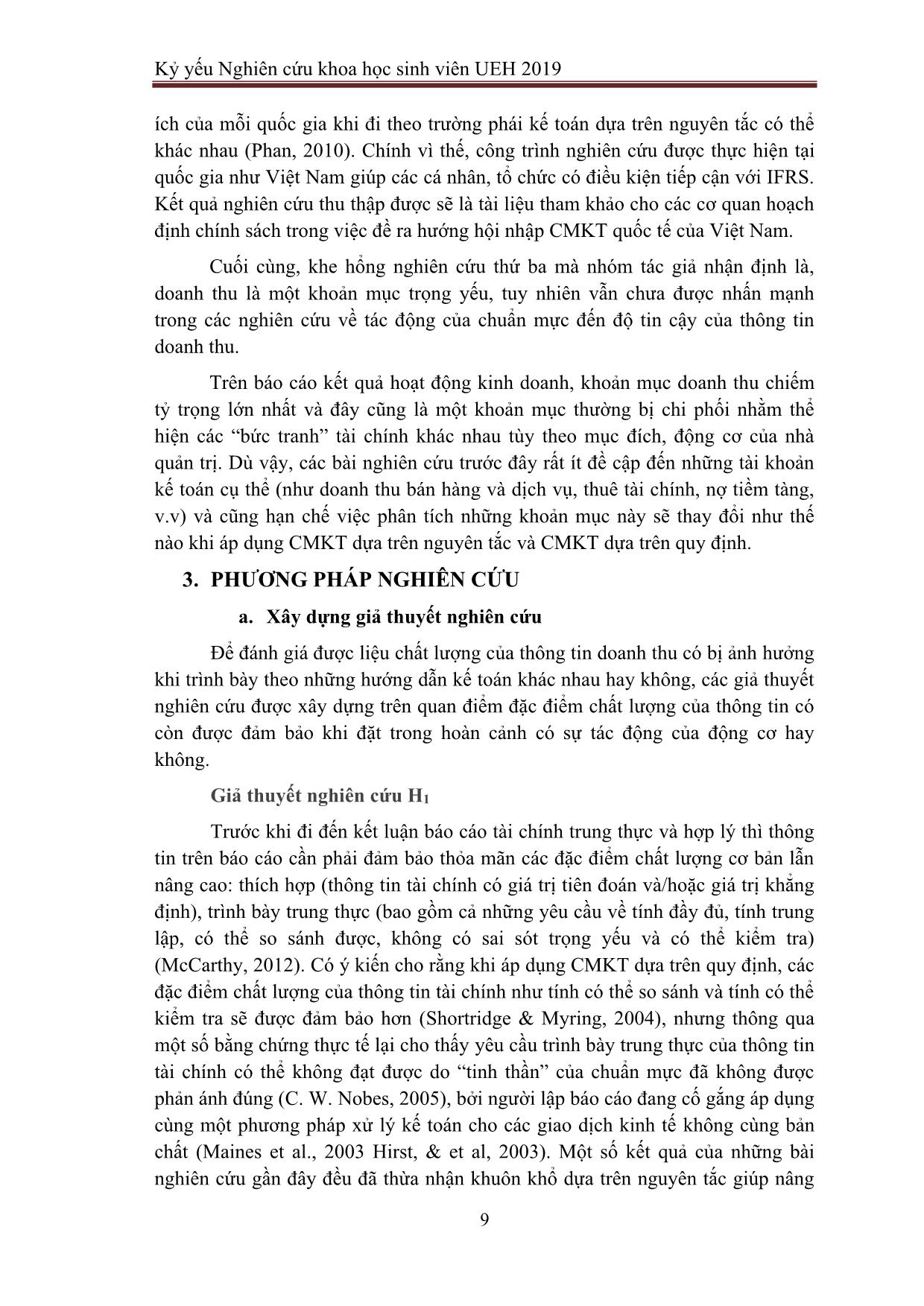
Trang 9
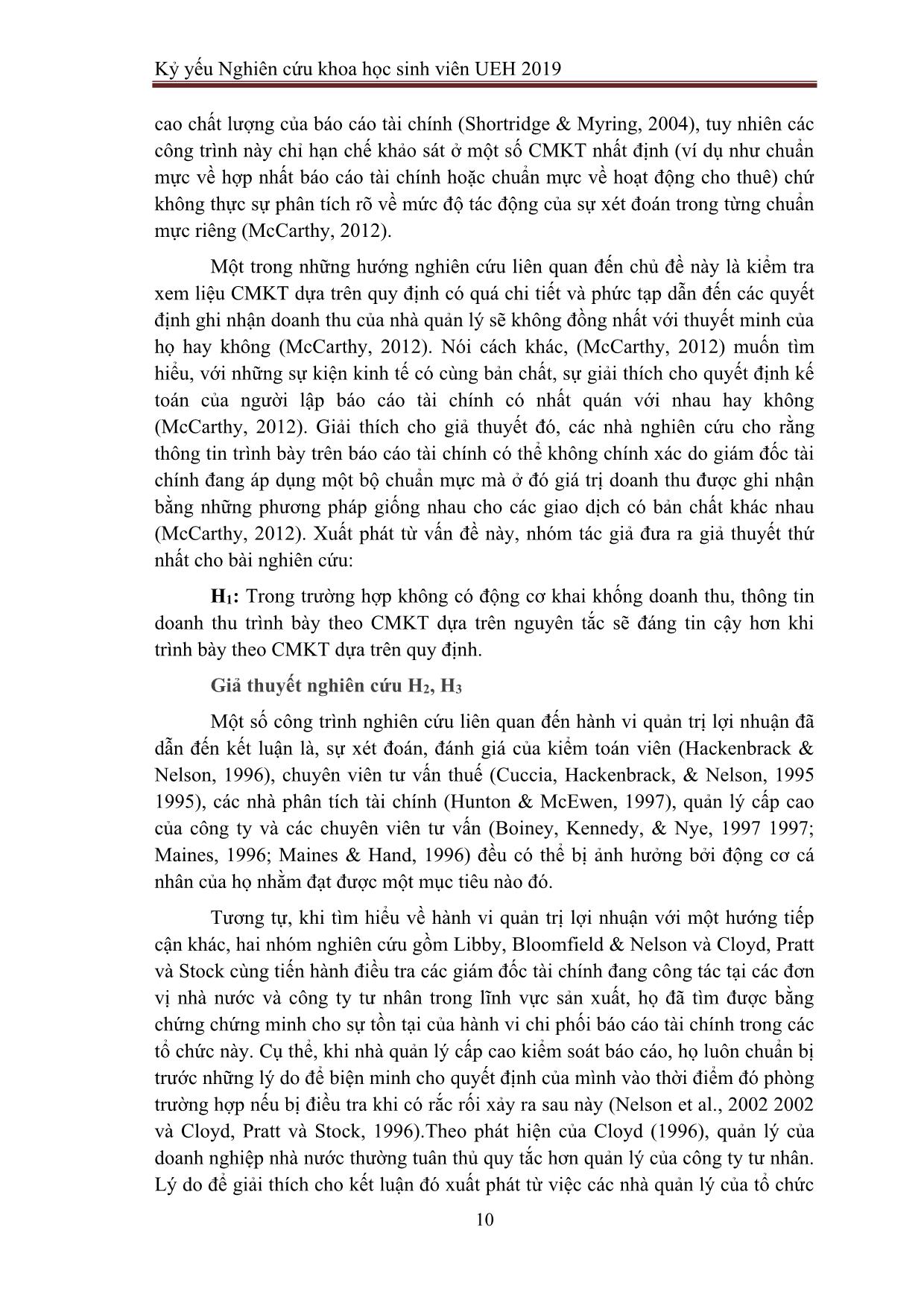
Trang 10
Tải về để xem bản đầy đủ
Tóm tắt nội dung tài liệu: Phân tích độ tin cậy của thông tin doanh thu được ghi nhận theo chuẩn mực kế toán dựa trên quy định và chuẩn mực kế toán dựa trên nguyên tắc
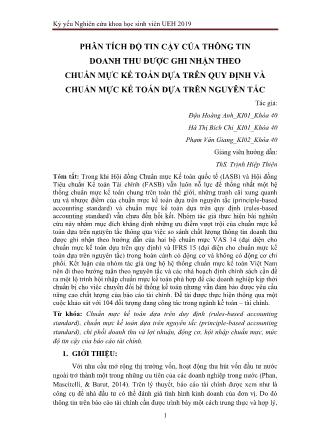
đáp thắc mắc của họ, do đó sau khi thống kê câu trả lời, tác giả nhận thấy trường hợp thông tin bị hiểu sai hoặc đọc sót giả thiết xảy ra rất nhiều. Vì vậy, giá trị doanh thu do những đối tượng này đề nghị thực sự không bị ảnh hưởng bởi động cơ cá nhân hay mức độ dễ hiểu, rõ ràng của chuẩn mực. Ngoài ra, trong tình huống giả định có sự xuất hiện của động cơ cá nhân, nhóm tác giả chỉ thêm thông tin về áp lực khen thưởng của Giám đốc điều hành cho Giám đốc tài chính để đại diện cho điều kiện về động cơ cá nhân. Tuy nhiên, dữ kiện này khó có thể thay thế với áp lực mà người quản lý gặp phải trong thực tế. Do đó, yếu tố động cơ đề cập trong bài nghiên cứu không thực sự tác động mạnh tới đối tượng tham gia khảo sát. Một hạn chế khác của đề tài liên quan đến quá trình áp dụng CMKT. Dù mỗi bản khảo sát đều trích dẫn đầy đủ hướng dẫn kế toán VAS/ IFRS theo từng trường hợp cụ thể nhưng nhóm tác giả không đảm bảo các đáp viên có đọc và tuân thủ theo hướng dẫn đính kèm hay không. Đó cũng có thể là nguyên nhân lý giải cho những đáp án trong tình huống áp dụng CMKT dựa trên nguyên tắc nhưng đối tượng tham gia khảo sát lại tính toán theo phương pháp của CMKT dựa trên quy định. Hạn chế tiếp theo của đề tài là về phạm vi của bài nghiên cứu. Vấn đề hội tụ CMKT đang được rất nhiều nước quan tâm, kết luận của đề tài có thể trở thành tài liệu tham khảo cho các nước đang phát triển như Việt Nam cân nhắc về hướng đi sắp tới. Tuy nhiên, trong khi đây được xem là một mối quan tâm toàn cầu, công trình nghiên cứu lại chỉ được thực hiện ở khu vực Thành phố Hồ Chí Minh - Việt Nam. d. Các hướng nghiên cứu tiếp theo Dựa vào kết quả nghiên cứu và hạn chế của đề tài, tác giả gợi ý hướng nghiên cứu tiếp theo như sau: Trong tương lai, các bài nghiên cứu với số lượng đối tượng tham gia khảo sát nhiều hơn và trong khoảng thời gian dài hơn sẽ cho kết quả khách quan hơn trong việc tìm hiểu mối quan hệ giữa mức độ tin cậy của thông tin doanh thu và loại CMKT áp dụng khi lập báo cáo tài chính. Tiếp theo, kết quả nghiên cứu chỉ dừng lại ở việc khẳng định thông tin doanh thu sẽ đáng tin cậy hơn khi người lập báo cáo áp dụng CMKT dựa trên Kỷ yếu Nghiên cứu khoa học sinh viên UEH 2019 27 nguyên tắc/ chuẩn mực IFRS, nói cách khác bài nghiên cứu không bao gồm những thừa nhận về sự cải thiện trong chất lượng của cả báo cáo tài chính. Do đó, nhóm tác giả mong muốn có thêm những nghiên cứu tương tự nhưng có thể thử nghiệm đối với khoản mục khác, có độ phức tạp tương tự hoặc cao hơn nhằm bổ sung cho kết luận thông tin tài chính sẽ chính xác hơn khi được trình bày theo chuẩn mực dựa trên nguyên tắc.. Cuối cùng, với những đặc điểm hữu ích của IFRS, nhóm nghiên cứu hi vọng rằng Việt Nam sẽ sớm chấp nhận IFRS, hội nhập với tiến trình thống nhất CMKT chung trên toàn thế giới. Cuối cùng, nhằm phục vụ cho công tác hội tụ với CMKT chung trên toàn thế giới, các đề tài nghiên cứu về lộ trình, cách thức chấp nhận CMKT dựa trên nguyên tắc hay Việt Nam nên đi theo một con đường mới, cần được thực hiện. Kỷ yếu Nghiên cứu khoa học sinh viên UEH 2019 28 TÀI LIỆU THAM KHẢO Aggarwal, Reena, Klapper, Leora, & Wysocki, Peter D. (2005). Portfolio preferences of foreign institutional investors. Journal of Banking & Finance, 29(12), 2919-2946. Agoglia, Christopher P, Doupnik, Timothy S, & Tsakumis, George T. (2011). Principles-based versus rules-based accounting standards: The influence of standard precision and audit committee strength on financial reporting decisions. The Accounting Review, 86(3), 747-767. Barth, Mary E, Landsman, Wayne R, & Lang, Mark H. (2008). International accounting standards and accounting quality. Journal of Accounting Research, 46(3), 467-498. Biddle, Gary C, Hilary, Gilles, & Verdi, Rodrigo S. (2009). How does financial reporting quality relate to investment efficiency? Journal of accounting and economics, 48(2-3), 112-131. Board, Financial Accounting Standard. (2002). Proposal: Principle-based approach to US standard setting. Financial Accounting Standard Board. Boiney, Lindsley G, Kennedy, Jane, & Nye, Pete. (1997). Instrumental bias in motivated reasoning: More when more is needed. Organizational Behavior and Human Decision Processes, 72(1), 1-24. Bonner, Sarah E. (1999). Judgment and decision-making research in accounting. Accounting Horizons, 13(4), 385-398. Bushman, Robert M, & Smith, Abbie J. (2001). Financial accounting information and corporate governance. Journal of accounting and economics, 32(1-3), 237-333. Caylor, Marcus L. (2010). Strategic revenue recognition to achieve earnings benchmarks. Journal of Accounting and Public Policy, 29(1), 82-95. Chen, Songsheng, Harris, Ling, Li, Wenying, & Wu, Donglin. (2015). How does XBRL affect the cost of equity capital? Evidence from an emerging market. Journal of International Accounting Research, 14(2), 123-145. Cloyd, C Bryan, Pratt, Jamie, & Stock, Toby. (1996). The use of financial accounting choice to support aggressive tax positions: Public and private firms. Journal of Accounting Research, 23-43. Công Phương, Nguyễn. (2013). Về mô hình chuẩn mực-Chế độ kế toán của Việt Nam. Tạp chí Kinh tế & Phát triển(194), 31. Kỷ yếu Nghiên cứu khoa học sinh viên UEH 2019 29 Cuccia, Andrew D, Hackenbrack, Karl, & Nelson, Mark W. (1995). The ability of professional standards to mitigate aggressive reporting. Accounting Review, 227-248. Dahiru, T. (2008). P – VALUE, A TRUE TEST OF STATISTICAL SIGNIFICANCE? A CAUTIONARY NOTE. Ann Ib Postgrad Med, 6(1), 21-26. DeAngelo, Harry, DeAngelo, Linda, & Skinner, Douglas J. (1994). Accounting choice in troubled companies. Journal of accounting and economics, 17(1-2), 113-143. Ding, Yuan, Hope, Ole-Kristian, Jeanjean, Thomas, & Stolowy, Hervé. (2007). Differences between domestic accounting standards and IAS: Measurement, determinants and implications. Journal of Accounting and Public Policy, 26(1), 1-38. Donelson, Dain C., McInnis, John M., & Mergenthaler, Richard D. (2012). Rules-Based Accounting Standards and Litigation. The Accounting Review, 87(4), 1247-1279. Ebaid, Ibrahim El-Sayed. (2016). International accounting standards and accounting quality in code-law countries: The case of Egypt. Journal of Financial Regulation and Compliance, 24(1), 41-59. Eisenhardt, Kathleen M. (1989). Agency theory: An assessment and review. Academy of management review, 14(1), 57-74. Ewert, Ralf, & Wagenhofer, Alfred. (2005). Economic Effects of Tightening Accounting Standards to Restrict Earnings Management. The Accounting Review, 80(4), 1101-1124. doi:10.2308/accr.2005.80.4.1101 Fisher, Ronald Aylmer. (1992). Statistical methods for research workers Breakthroughs in Statistics (pp. 66-70): Springer. Francis, Jere R, & Martin, Xiumin. (2010). Acquisition profitability and timely loss recognition. Journal of accounting and economics, 49(1-2), 161-178. Hackenbrack, Karl, & Nelson, Mark W. (1996). Auditors' incentives and their application of financial accounting standards. Accounting Review, 43-59. Healy, Paul M. (1985). The effect of bonus schemes on accounting decisions. Journal of accounting and economics, 7(1-3), 85-107. Healy, Paul M, & Wahlen, James M. (1999). A review of the earnings management literature and its implications for standard setting. Accounting Horizons, 13(4), 365-383. Kỷ yếu Nghiên cứu khoa học sinh viên UEH 2019 30 Holthausen, Robert W, Larcker, David F, & Sloan, Richard G. (1995). Annual bonus schemes and the manipulation of earnings. Journal of accounting and economics, 19(1), 29-74. Hunton, James E, & McEwen, Ruth Ann. (1997). An assessment of the relation between analysts' earnings forecast accuracy, motivational incentives and cognitive information search strategy. Accounting Review, 497-515. ICAEW, EU. (2007). implementation of IFRS and the Fair Value Directive: a report for the European Commission. Institute of Chartered Accountants in England and Wales. Jamal, Karim, & Tan, Hun-Tong. (2010). Joint effects of principles-based versus rules-based standards and auditor type in constraining financial managers’ aggressive reporting. The Accounting Review, 85(4), 1325-1346. Jensen, Michael C, & Meckling, William H. (1976). Theory of the firm: Managerial behavior, agency costs and ownership structure. Journal of financial economics, 3(4), 305-360. Kao, Tzu-Han Wei Hui-Sung. (2014). The effect of IFRS, information asymmetry and corporate governance on the quality of accounting information. Asian Economic and Financial Review, 4(2), 226. Kunda, Ziva. (1990). The case for motivated reasoning. Psychological bulletin, 108(3), 480. LaFond, Ryan, & Watts, Ross L. (2008). The information role of conservatism. The Accounting Review, 83(2), 447-478. Lamoreaux, Matthew G. (2012). A new system for recognizing revenue. Journal of accountancy, 213(1), 30. Leuz, Christian, & Verrecchia, Robert E. (2000). Search in. Journal of Accounting Research, 38, 91-124No. Libby, Robert, Bloomfield, Robert, & Nelson, Mark W. (2002). Experimental research in financial accounting. Accounting, Organizations and Society, 27(8), 775-810. Maines, Laureen A. (1996). An experimental examination of subjective forecast combination. International Journal of Forecasting, 12(2), 223-233. Maines, Laureen A, Bartov, Eli, Fairfield, Patricia, Hirst, D Eric, Iannaconi, Teresa E, Mallett, Russell, . . . Vincent, Linda. (2003). Evaluating concepts-based vs. rules-based approaches to standard setting. Accounting Horizons, 17(1), 73-89. Kỷ yếu Nghiên cứu khoa học sinh viên UEH 2019 31 Maines, Laureen A, & Hand, John RM. (1996). Individuals' perceptions and misperceptions of time series properties of quarterly earnings. Accounting Review, 317-336. McCarthy, Mary. (2012). Financial statement preparers' revenue decisions: Accuracy in applying rules-based standards and the IASB-FASB revenue recognition model: Nova Southeastern University. Naoum, Vasilios-Christos, Sykianakis, Nicos, & Tzovas, Christos. (2011). The perceptions of managers of Greek firms regarding the Costs and Benefits ensuing from the adoption of International Financial Reporting Standards in Greece. International Journal of Economic Sciences & Applied Research, 4(3). Nelson, Mark W. (2003). Behavioral evidence on the effects of principles- and rules-based standards. Accounting Horizons, 17(1), 91-104. Nelson, Mark W, Elliott, John A, & Tarpley, Robin L. (2002). Evidence from auditors about managers' and auditors' earnings management decisions. The Accounting Review, 77(s-1), 175-202. Nobes, Christopher. (2003). On the myth of “Anglo-Saxon” financial accounting: A comment. The International Journal of Accounting, 38(1), 95-104. Nobes, Christopher W. (2005). Rules‐Based Standards and the Lack of Principles in Accounting. Accounting Horizons, 19(1), 25-34. doi:10.2308/acch.2005.19.1.25 Phan, Duc Hong Thi. (2010). The Relevance of International Financial Reporting Standards (IFRS) to a Developing Country: Evidence from Vietnam. Phan, Duc Hong Thi, Mascitelli, Bruno, & Barut, Meropy. (2014). Perceptions towards international financial reporting standards (IFRS): The case of Vietnam. Pott, Christiane, Tebben, Tobias, & Watrin, Christoph. (2012). The effect of outside directors’ and auditors’ incentives on managers’ ability to manage cash bonuses. Journal of Management & Governance, 18(2), 505-540. doi:10.1007/s10997-012-9252-3 Pozen, R. (2007). Discussion paper for consideration by the SEC Advisory Committee on Improvements to Financial Reporting. Draft dated, 7(31), 07. Psaros, Jim. (2007). Do principles‐based accounting standards lead to biased financial reporting? An Australian experiment. Accounting & Finance, 47(3), 527-550. Kỷ yếu Nghiên cứu khoa học sinh viên UEH 2019 32 Psaros, JIM, & Trotman, Ken T. (2004). The impact of the type of accounting standards on preparers’ judgments. Abacus, 40(1), 76-93. Rajgopal, Shivaram, Venkatachalam, Mohan, & Jiambalvo, James. (1999). Is institutional ownership associated with earnings management and the extent to which stock prices reflect future earnings? Ratings, Fitch. (2004). Mind the GAAP: Fitch's View on Insurance IFRS. World Wide Web: fitch. fr/pdf/rapports/asu_rap_28. pdf (accessed April 27, 2006). Riahi-Belkaoui, Ahmed. (2004). Accounting theory: Cengage Learning EMEA. Schipper, Katherine. (1989). Commentary on earnings management. Accounting Horizons, 3(4), 91-102. Schipper, Katherine. (2003). Principles-based accounting standards. Accounting Horizons, 17(1), 61-72. Securities, & Commission, Exchange. (2003a). Final rule: Management’s reports on internal control over financial reporting and certification of disclosure in exchange act periodic reports. Retrieved July, 24, 2008. Securities, & Commission, Exchange. (2003b). Study pursuant to Section 108 (d) of the Sarbanes-Oxley Act of 2002 on the adoption by the United States financial reporting system of a principles-based accounting system. July, 25, 2003. Securities, & Commission, Exchange. (2008). Roadmap for the potential use of financial statements prepared in accordance with International Financial Reporting Standards by US issuers. Proposed Rule. Securities, & Commission, Exchange. (2010). Commission statement in support of convergence and global accounting standards. Retrieved April, 2, 2010. Shortridge, Rebecca Toppe, & Myring, Mark. (2004). Defining principles- based accounting standards. The CPA Journal, 74(8), 34. Soderstrom, Naomi S, & Sun, Kevin Jialin. (2007). IFRS adoption and accounting quality: a review. European Accounting Review, 16(4), 675-702. Sunder, Shyam. (2009). IFRS and the accounting consensus. Accounting Horizons, 23(1), 101-111. Sweeney, Amy Patricia. (1994). Debt-covenant violations and managers' accounting responses. Journal of accounting and economics, 17(3), 281-308. Kỷ yếu Nghiên cứu khoa học sinh viên UEH 2019 33 Trọng, Hoàng, & Ngọc, Chu Nguyễn Mộng. (2008). Phân tích dữ liệu nghiên cứu với SPSS. NXB Hồng Đức. Uzma, Shigufta Hena. (2016). Cost Benefit Analysis of IFRS Adoption: Developed & Emerging Countries. Journal of Financial Reporting and Accounting, 14, 198-229. Watts, Ross, & Zimmerman, Jerold. (1986). Positive theory of accounting. Englewood Cliffs, NY: Prentice-Hall. Whittington, Geoffrey. (2008). Harmonisation or discord? The critical role of the IASB conceptual framework review. Journal of Accounting and Public Policy, 27(6), 495-502. Wüstemann, Jens, & Wüstemann, Sonja. (2010). Why consistency of accounting standards matters: A contribution to the rules‐versus‐principles debate in financial reporting. Abacus, 46(1), 1-27.
File đính kèm:
 phan_tich_do_tin_cay_cua_thong_tin_doanh_thu_duoc_ghi_nhan_t.pdf
phan_tich_do_tin_cay_cua_thong_tin_doanh_thu_duoc_ghi_nhan_t.pdf

